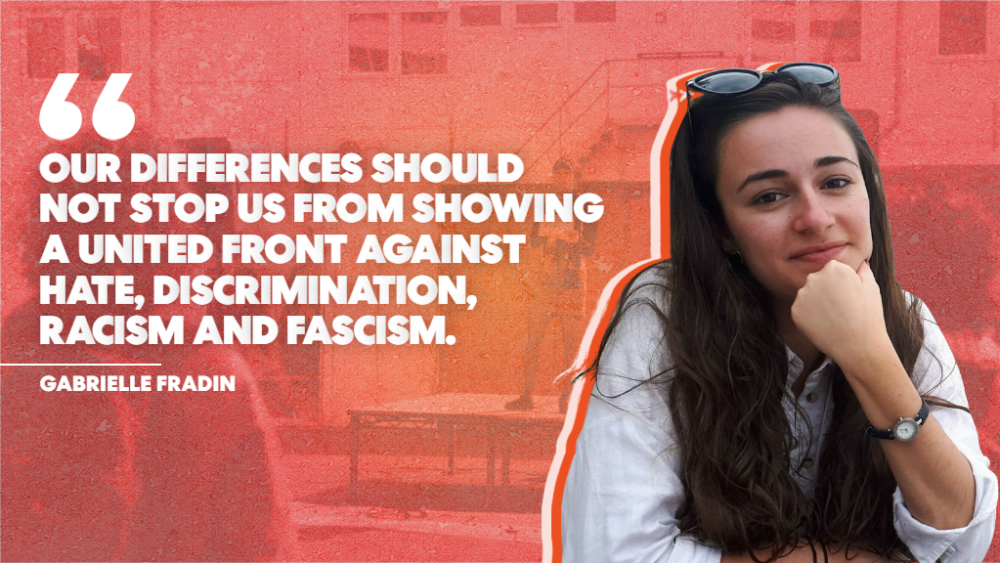DiEM25 activist Gabrielle Fradin gave an impassioned speech about the normalisation of far-right rhetoric that can be witnessed in seemingly innocent everyday situations and conversations, before sharing her views on what can be done to turn the tide.
Gabrielle’s speech:
Dear comrades, friends and fellow activists. Thanks for giving me the opportunity to share with you some reflections of mine about the political times we are navigating right now.
Let me begin with a personal anecdote on the normalisation of far-right rhetoric. This story is about someone – let’s call him John.
John is lovely to be around. He’s also, despite his rather privileged position in society, quite reflective and very aware of racism, sexism and the overall harms of neoliberalism.
For example, he’s shown great support to all the housing protests happening across the country. In sum, he is what we could call a ‘left-wing progressive’. Last month, I had dinner with him and we started to talk about migration – I obviously told him I was in favour of open borders and free movement for all because, let’s be clear: f*** their borders.
To this he replied that this is a completely utopian position and that if Western Europe was to open all its borders, we would be swamped in waves of refugees arriving from the Global South.
I was speechless. I could not believe it. How could he repeat such right-wing propaganda? How could he repeat this xenophobic and racist lie straight out of the far right whose only goal is to instil fear among the people? The fact that John repeats it is scary.
Fascist rhetoric is infiltrating society at a dangerous rate. We need to realise that such rhetoric is not just perpetrated by a fringe neo-Nazi group, it has become a normal and acceptable position to have. This is dangerous and we need to actively go against this trend.
Now our society has allowed racism to reach a hegemonic position. It is a normal part of our institutions. When I talk about this, I, of course, think of the Toeslaggenaffaire. Tens of thousands people of colour were unjustly harmed because of who they were, and yet, to this day, there have been NO prosecutions, NO accountability, NO truth.
To top it off, the obviously racist minister in charge of the Belastingdienst at the time of the scandal is now the minister of foreign affairs.
This is an extremely dangerous precedent to set – although, let’s be real, the Dutch state has a long history of casually carrying out racist policies.
So no, racism and fascism are not a thing of the past, they are real, grounded in the very essence of our current society and their poisonous tentacles are growing every day. Now we all know what happens next – you’ve instilled fear into society, the fear of the other – then you exploit it for your own political ends.
Organising for change
To this, we need to answer by showing and living the alternative.
Our resistance begins at home. Our resistance begins by unconditionally opening our doors, hearts and minds to all who suffer no matter who they are or where they come from. We need to strive for mutual aid. We need to create interdependence over their competition. We need to organise to increase our power and influence. The ills that we see, the impunity that we witness are all reflective of our level of influence. We need to reverse the power dynamics.
To achieve this we need to get involved in the political arena that is available to us – be it on the streets during demonstrations, at the ballot box during elections or as part of community centres and political assemblies. But we also need to create our own political alternatives based on radically democratic and just institutions. We have to embody this change to show others the alternative we carry. Because change is possible.
Actually, change is already happening – from the Rojava revolution to the Zapatistas in Chiapas, these people are already paving the way. They are pushing their population to be politicised, and involved in decision-making, away from neoliberal alienation. They help build and sustain a vibrant and politically fierce civil society, the most robust bastion against the rise of fascism.
Inspired by such examples, this is exactly what we’re trying to achieve in our movement, DiEM25, where people have extensive oversight on the movements work and electoral parties.
Now, what do all these examples have in common? People decided to unite. Simply. Despite their ideological differences, they came together.
Conclusion
In fact, when I wrote these words, it reminded me of a French folk song about freedom (Le Pieu, by Marc Robine). The song is based on an allegory. We, the people, are all tied to this pole by a rope that prevents us from being free. It goes on to say that if I, alone, pull on the rope, the pole will stand still, not moving one inch. Only if you come by my side and pull with me can we make the pole fall and free ourselves.
We all need to come together and pull as much as we came on this metaphorical rope to liberate ourselves as a united front. To free ourselves, we need to collaborate, to grow our power and resistance together towards the liberation of all. Our differences should not stop us from showing a united front against hate, discrimination, racism and fascism. Thank you.
Gabrielle’s speech was co-written by DiEM25 policy coordinator Amir Kiyaei.
Do you want to be informed of DiEM25's actions? Sign up here










